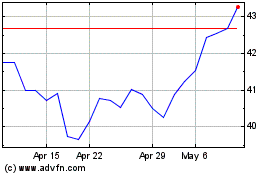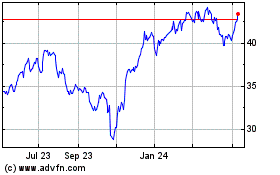By Yuka Hayashi
The credit-reporting industry has largely escaped new oversight
from Washington following the 2017 hack of Equifax Inc. that
exposed the personal information of millions of Americans. That
could change in 2019 when Democrats take over the House of
Representatives.
House Democrats have put legislation responding to the Equifax
hack at the top of their agenda next year. A handful of existing
proposals, some bipartisan, offer a road map for possible changes
to how the industry handles consumer information, including
subjecting credit-reporting companies to tougher cybersecurity
standards and making it easier for consumers to fix errors on their
credit reports.
"The Equifax data breach response is far from over," said Jaret
Seiberg , an analyst for Cowen Washington Research Group. "There
will be more legislation in the next two years that impacts Equifax
and the other credit bureaus."
An Equifax spokesman said the company has already undertaken "a
host of security, operational, and technological improvements"
since the breach.
Lawmakers from both parties harshly criticized Equifax after the
company announced the data breach that resulted in the loss of
Social Security numbers and other sensitive personal information of
147.9 million people.
That led to the proposal of several bills to increase oversight
of credit- reporting companies, which collect data on consumers'
financial history to help lenders vet applications for mortgages,
credit cards and other products that require a gauge of
credit-worthiness. Legislation mostly stalled, however, amid
pushback from the industry and disagreement between Republicans and
Democrats over what should be done.
One exception was a provision to allow adults and children to
freeze and unfreeze their credit reports free of charge to prevent
identity thieves from using their information to open new accounts.
That was approved earlier this year as part of a broader banking
bill.
Rep. Maxine Waters (D., Calif.), the incoming chair of the House
Financial Services Committee, wants to revive the credit-reporting
debate, saying her panel would focus on the industry and use as a
template a bill she introduced last year to overhaul the
industry.
Those proposals include enhancing consumers' ability to fix
credit-reporting errors by making it easier to dispute the accuracy
of information contained in reports, and requiring companies to
present documents used as a basis for disputed information. Another
provision would prohibit employers from using credit reports.
"I believe that credit reporting reform and holding Equifax
accountable for its massive breach are bipartisan issues that touch
nearly every American," she said in November. Her committee is
expected to hold a hearing in early 2019 on the issue, possibly
with testimony from top officials at the three main credit-
reporting companies, Equifax, Experian PLC, and TransUnion.
Any proposals must have bipartisan support to clear both
chambers of Congress, where Democrats will control the House and
Republicans the Senate.
Some Senate Republicans, including Senate Banking Committee
Chairman Mike Crapo (R., Idaho), have expressed interest in the
issue, raising the prospect of a bipartisan deal. Sens. John
Kennedy (R. La.,) and Brian Schatz (D., Hawaii), for instance,
proposed legislation in March to give consumers more control over
their credit reports. This included requiring the top
credit-reporting companies to create a website for consumers to get
free access to their credit information and easily opt out of
having their data shared or sold to third parties.
Rep. Patrick McHenry (R., N.C.), expected to be the top
Republican on the House financial services panel, has proposed
submitting credit-reporting companies to government cybersecurity
examinations as part of a bill he introduced in 2017.
Trying to fend off the legislative proposals, the
credit-reporting industry said government oversight has already
increased in response to the hack, with the Consumer Financial
Protection Bureau starting to examine the companies for data
security.
"A lot has already been done," said Francis Creighton, chief
executive of the Consumer Data Industry Association, a trade group
for the industry. "It's important to point out good things have
happened since the Equifax crisis."
Mike Litt, consumer campaigns director for U.S. PIRG, a consumer
group, urged Congress to do more. "More than a year later, Equifax
hasn't paid the price for losing nearly 150 million Social Security
numbers," he said.
The House Oversight Committee, which has responsibility for data
security, issued reports in December that were critical of the
Equifax breach, setting the stage for the congressional debate next
year. The Republican report, based on findings from a 14-month
investigation, concluded the incident was "entirely
preventable."
Democrats in their own report separately listed several
legislative solutions, including requiring Equifax and other
government contractors to comply with tougher cybersecurity
standards and drawing up a framework for how companies notify
data-breach victims.
Write to Yuka Hayashi at yuka.hayashi@wsj.com
(END) Dow Jones Newswires
January 01, 2019 13:08 ET (18:08 GMT)
Copyright (c) 2019 Dow Jones & Company, Inc.
Experian (QX) (USOTC:EXPGY)
Historical Stock Chart
From Mar 2024 to Apr 2024

Experian (QX) (USOTC:EXPGY)
Historical Stock Chart
From Apr 2023 to Apr 2024
